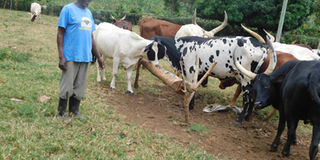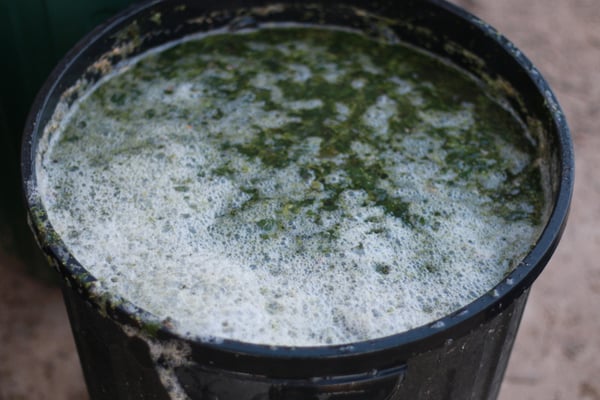Prime
Asiimwe’s mixed farming venture bears him fruits

Joseph Asiimwe in his kraal. The farmer uses the dung from his animals to fertilise his vegetables. Photos / Michael J Ssali
What you need to know:
- As a founder member of Kyazanga Coffee Farmers’ Cooperative Society, Joseph Asiimwe believes that farmers are better off forming cooperative societies and micro-finance institutions so that they have easy access to credit.
Everywhere in Kyazanga Sub-region, in Lwengo District, Joseph Asiimwe, a resident of Kirumba Village in Kyazanaga Sub-county, is a well-known man.
Now aged 76, he recently told Seeds of Gold, “I have had to retire from most of my leadership positions because I feel I have played my part and it is time for others to take over.”
He has been leader of the laity (Sabakristu) at Kyazanga Catholic Parish for years and he has been treasurer there and served in different other capacities as a lay church leader.
Farming journey
For decades he has been mobilising fellow farmers to attend meetings organised by Masaka Diocese Development Organisation (MADDO) to learn modern farming practices.
He is behind the creation of Kyazanga Farmers’ Cooperative Society which today has a membership of 1088 members.
“Nowadays the cooperative society has its own office block but for several years, especially when it was still a mere farmers group, it operated right here in my own house,” he revealed. He was a board member of Masaka District Cooperative Union and he also served as Secretary for Finance, Masaka District Local Council.
The father of 13, nearly all of whom have completed their education, Asiimwe is now fully devoted to farming which has been his passion since he left Kampala where he was employed as an accountant in different institutions including British American Tobacco, Produce Marketing Board, and Lint Marketing Board in the early 1980s.
Capital
“It was with my personal savings as an employee in those days that I bought my initial piece of land here, then measuring just about three or four acres,” says Asiimwe.
He was later to expand it by buying more land from his immediate neighbours most of whom were returning to Rwanda, their country of origin, in the mid-90s. Today his farm is 89 acres wide and he keeps cattle, besides growing bananas, coffee, beans, and maize.
“Immediately after leaving Kampala in the early 80s I settled here with one of my cousins who was a very hardworking person,” he says. “We grew bananas and beans which we sold to earn money. But since I had come to know a lot of people who included successful businessmen when I was still in Kampala I took advantage of their contacts and began traveling to Kasese and Rukungiri districts from where I would buy coffee and transport it to Masaka Cooperative Union where I sold it.” The coffee trade turned out to be quite lucrative and that is how he raised enough money to build his present, very impressive, tiled roof house. He would recover the coffee husks and use them as manure for his banana plantation. “Sometimes we would sell as many as a hundred bunches of bananas per month,” says Asiimwe.
How Asiimwe does it differently
Today, his farm is divided into different parts. Five acres are devoted to coffee, six acres are for growing bananas, and the rest of the land is devoted to maize, beans, and pasture for cattle.

Assimwe stands by one of the tractors hired out to farmers.
It is interesting how he has made the different farming activities complement each other. He has about 20 heads of cattle and he uses their dung as manure for his banana and coffee gardens.
Since the kraal is located slightly higher on the slope than the coffee garden, all the run-off rain water from the cattle resting ground flows into the coffee garden carrying with it a lot of soil enriching material. Dry bean residues are used as mulch in the coffee plantation.
The cow dung is deposited in the banana plantation and in the coffee plantation. He uses maize left-overs and coffee husks as mulch in the banana plantation.
Best practices
His advice to other farmers is that they should be careful how they apply mulch in the banana garden. He says when the mulch is extended too close to the banana stem it increases multiplication of weevils. So he encourages the farmers to keep an uncovered space all around the banana stem. He also discourages the practice of keeping too many suckers around the stem since they will not permit production of big bunches. He calls it agricultural hygiene.
Market
His banana harvest is good most of the time, and his average monthly sale is 100 bunches. He always ensures that there are no weeds anywhere on his farm where he employs a few casual labourers.
Sometimes he harvests a 100 gunny bags of beans and 200 gunny bags of maize all of which he sells through Kyazanga Farmers’ Cooperative Society, which he was instrumental in establishing. “I have always kept cattle because it is important for a crop farmer to be a livestock keeper,” he says. “Animals such as goats or cattle can be fed on crop residues and yet livestock droppings can be used as manure for the crops.” He was among the first people to plant cloned Robusta coffee in the area. Because of the abundant soil nutrients all his crops look healthy and grow with a lot of vigour. He harvests an average of between 50 and 60 gunny bags of dry coffee cherries annually and he has mobilised fellow coffee farmers under Kyazanga Farmers’ Cooperative Society to market their coffee through National Union of Coffee and Agribusinesses and Farm Enterprises (NUCAFE) in order to attract better prices and higher profits.
As a founder member of Kyazanaga Coffee Farmers’ Cooperative Society he believes that farmers are better off forming cooperative societies and micro-finance institutions so that they have easy access to credit.
“We work hand-in-hand with the National Agricultural Research Organisation (Naro) and the Ministry of Agriculture, Animal Industries, and Fisheries (MAAIF) as seed producers and good quality bean and maize growers. So we sell our products at much higher prices and we earn bigger profits,” he says. They also have a savings and credit section from which members can borrow money to make improvements in their households and to settle some issues such as purchasing fertilisers and other farm inputs, paying school fees, or buying land. The society also employs some agriculture extension officers who visit the individual member farmers providing guidance on what best practices to adopt in order to come up with good yields.
He is in charge of a few tractors owned by some family members, and farmers in the neighbourhood hire them for ground preparation.
Challenges
Asiimwe has some challenges. When Seeds of Gold visited him, some thieves had visited his coffee plantation the previous night and harvested ‘where they did not sow’. His banana plantation is under attack by the deadly Banana Bacterial Wilt. He fights it by using his home made concoction of tobacco mixed with a poisonous herb locally known as oluwoko, some ash, water, and urine. The solution is kept in a drum for some four days before it is applied on some banana trees in an infected area. “The concoction is also useful in fighting banana weevils,” he says. “However Banana Bacterial Wilt is difficult to destroy with natural pesticides,” he admits. “The best thing is to cut down the infected plants and to sprinkle them with the pesticide so that no flying insect or bird transfers the disease from the dying plantain to the healthy ones,” says Asiimwe.

The farmer points to an uncovered area around the banana stem and says the practice minimises pest infestation.
His other challenge is the unpredictable weather pattern these days. “We have experienced some very long droughts of late and right now we have lost all the maize that we had planted on an entire 30 acres because of lack of rain,” he says.
He is however quite thankful to God for giving him the vision to become a farmer. “I am kept occupied and well employed in my old age, with no rent or food security worries,” he says.
He believes in good nutrition for his household. So he grows his own vegetables. Nearly everywhere in his banana plantation one can see katunkuma shrubs and several local vegetables such as jjobyo, and nsugga.
How he does it
Joseph Asiimwe has divided his farm into different parts. Five acres are devoted to coffee, six acres are for growing bananas, and the rest of the land is devoted to maize, beans, and pasture for cattle. It is interesting how he has made the different farming activities complement each other. He has about 20 heads of cattle and he uses their dung as manure for his banana and coffee gardens.
Advice
Joseph Asiimwe’s advice to other farmers is that they should be careful how they apply mulch in the banana garden. He says when the mulch is extended too close to the banana stem it increases multiplication of weevils. So he encourages the farmers to keep an uncovered space all around the banana stem.




